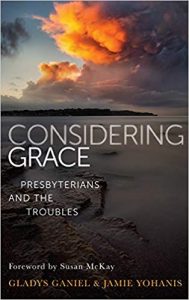 Graham Spencer, Reader in Political Conflict at the University of Portsmouth, has reviewed my book (co-authored with Jamie Yohanis), Considering Grace: Presbyterians and the Troubles. It has just been published in Irish Political Studies (18 March 2021).
Graham Spencer, Reader in Political Conflict at the University of Portsmouth, has reviewed my book (co-authored with Jamie Yohanis), Considering Grace: Presbyterians and the Troubles. It has just been published in Irish Political Studies (18 March 2021).
Spencer writes that the book thoughtfully and sensitively’ explores difficult questions, ending his review with a pointed question:
Apart from a few individuals, the churches in Northern Ireland did little to actively try and end the conflict. The question now is can they play a more constructive role in building peace? Or, to put it more specifically, can they help the public recognise the value of considering grace? That is the terrain this important book takes us into.
Excerpts from the Review:
Since the Good Friday Agreement of 1998 numerous proposals have been put forward concerning legacy processes that can help Northern Ireland move on from its violent past to a more stable and positive future. Most proposals have been determined at party political, official or government level and are more concerned with corporate notions of responsibility and blame than the emotional and cognitive needs of victims. Since it is individuals who have borne pain and suffering one might reasonably assume that it is individuals who should be at the forefront of legacy debates, whether in the context of therapeutic support or as part of some wider social conversation. This has not been the case.
… However, loyalty in Northern Ireland is not just a matter of political affiliation but religious affiliation too. And, as is well known, the historical influence of religion there does not always sit well with notions of tolerance or the advocacy of non-violence and forgiveness. Although religious affiliation, like political affiliation, risks providing the researcher a potentially neat but also overly simplistic categorisation for making sense of often complex and contradictory experiences, it nevertheless can generate a useful starting point for engaging with different conceptualisations about grief. Why should one forgive and what happens if one feels unable to forgive? What does healing mean and what happens to those who cannot make gestures of generosity, consumed as they are by an overwhelming sense of grief and loss?
Such areas are thoughtfully and sensitively explored by Ganiel and Yohanis in Considering Grace, which draws from 120 interviews conducted to find out how those of Presbyterian background (the book was produced in collaboration with the Presbyterian Church in Ireland) have experienced the anger, pain, healing and forgiveness of conflict. The interviews that seek to address how grace (‘defined as free and unmerited favour, extended to those who don’t deserve it’ (p. 2)) is conceived and shaped by a Presbyterian outlook are collated under headings such as security force personnel, ministers, peacemakers and health care and emergency service workers but they also address the effects of paramilitary violence and engage with those who, given the devastating effects of loss, no longer feel sustained by Presbyterianism as they once did. One can always ask why a wider range of groups from civic society, business, art and culture etc. were not included but that would be to miss the point, which is that the testimonies and responses here are enough to give us a valuable and much-needed insight into how faith influences or not the personal experience of suffering after conflict.
… The authors acknowledge that the book is not designed ‘to claim a moral high ground for Presbyterians’ but to share ‘the diversity of Presbyterian experiences of the Troubles with a wider audience’ and to ‘prompt reflection on the horror of violence’ (p. 242) in the process. Yet these reflections perhaps do more. They also reveal how within religious communities there are tensions and even contradictions when it comes to coping with grief.
… The struggle to live with pain and suffering is overwhelmingly a personal one and in that private world experiences shift and transform, becoming helpful one moment and problematic the next. Some things blur while others harden into relief. … This difference enables us to see that while struggling with the pain of loss is unsurprisingly about how one continues to live with emptiness and the myriad effects of grief, the act of struggle can also bring about new hope and possibility. …
The authors rightly contend that the concept of reconciliation has, so far, not gripped the public imagination in Northern Ireland and that a generosity of spirit and extending grace through new relationships is important even if those relationships are often best developed quietly and informally. The tension between simplistic divisions of political discourse and the complex nature of private needs is surely one that merits far greater attention when contemplating how the pain of the past is encountered and experienced and the testimonies elicited by Ganiel and Yohanis powerfully bring to light that reality. Apart from a few individuals, the churches in Northern Ireland did little to actively try and end the conflict. The question now is can they play a more constructive role in building peace? Or, to put it more specifically, can they help the public recognise the value of considering grace? That is the terrain this important book takes us into.